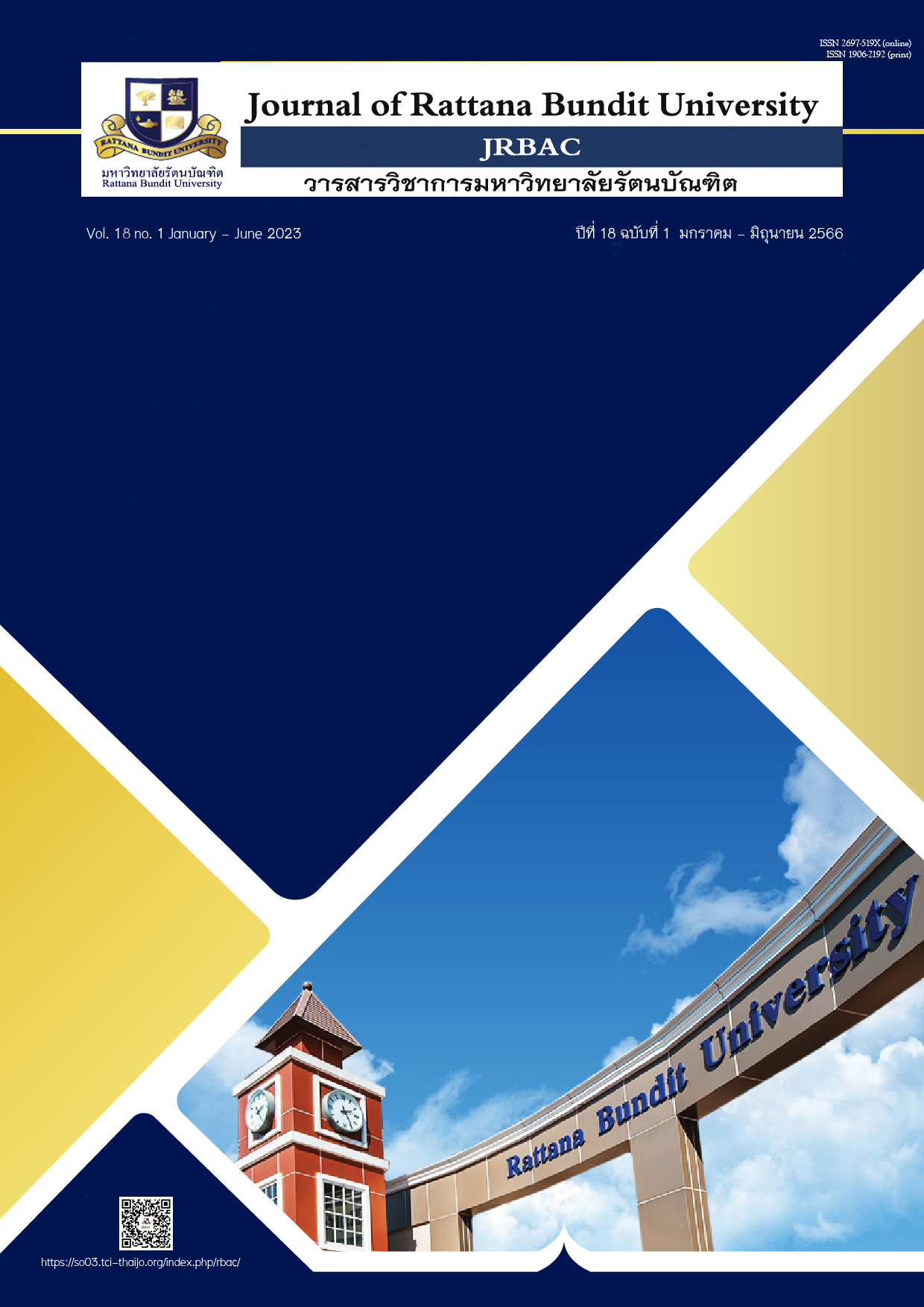Confirmatory Factor Analysis of the World Health Organization's Quality of Life Measurement Model for the Elderly (WHOQOL-OLD): A Case Study of the Elderly Club’s Members in Bangkok
Main Article Content
Abstract
The purpose of this research was to examine the confirmatory factors of the Quality of Life Measurement Model for the Elderly of the World Health Organization with empirical data. The data were gathered from 815 senior people who were members of the elderly club in Bangkok and were chosen using a multi-stage selection process. The World Health Organization's Quality of Life of the Elderly Questionnaire was utilized to get the data. The quality of life assessment questionnaire for the elderly, created by the World Health Organization, was found via data analysis using the confirmatory factor analysis model approach. The research findings indicated that each of the six components of the World Health Organization's quality of life evaluation for the elderly was congruent with empirical data. Past, present and future activities component values are at the highest level, then followed by social participation, intimacy, autonomy, sensory abilities and death and dying.
Article Details

This work is licensed under a Creative Commons Attribution-NonCommercial-NoDerivatives 4.0 International License.
References
กรมกิจการผู้สูงอายุ. (2565). แผนปฏิบัติการด้านผู้สูงอายุระยะที่ 3 (พ.ศ.2566-2580). https://www.dop.go.th/download/laws/th1653553501-843_0.pdf
กรมกิจการผู้สูงอายุ. (2565). สถิติผู้สูงอายุ สัญชาติไทย และ มีชื่ออยู่ในทะเบียนบ้าน มกราคม 2565. https://www.dop.go.th/th/know/1/1159
กระทรวงการพัฒนาสังคมและความมั่นคงของมนุษย์. (2561). สถิติผู้สูงอายุของประเทศไทย 77 จังหวัด ณ วันที่ 31 ธันวาคม 2561. กรมการปกครอง.
ขวัญใจ ทองศรี. (2564). คุณภาพชีวิตที่ดีตามแนวพุทธจิตวิทยา. วารสาร มจร. มนุษยศาสตร์ปริทรรศน์, 7(2), 322-333.
จุฬาลงกรณ์มหาวิทยาลัย คณะพยาบาลศาสตร์ และสำนักงานกองทุนสนับสนุนการสร้างเสริมสุขภาพ. (2561). คู่มือ เรียนรู้เข้าใจวัยสูงอายุ. ยืนยงการพิมพ์.
พระพรหมคุณาภรณ์ (ป.อ.ปยุตฺโต). (2557). สุขภาวะองค์รวมแนวพุทธ. วัดญาณเวศกวัน.
วชิรญาณ์ จิตต์รุ่งเรือง. (2560). คุณภาพชีวิตของผู้สูงอายุในศูนย์พัฒนาการจัดสวัสดิการสังคมผู้สูงอายุบ้านบางละมุง จังหวัดชลบุรี (สารนิพนธ์มหาบัณฑิต). มหาวิทยาลัยบูรพา.
สำนักงานสถิติแห่งชาติ. (2561). สถิติบอกอะไร ผู้สูงวัยปัจจุบันและอนาคต. http://www.nso.go.th/sites/2014/Pages/Press_Release/2561/N10-04-61-1.aspx
สิน พันธุ์พินิจ. (2554). เทคนิคการวิจัยทางสังคมศาสตร์. วิทยพัฒน์.
สุธินี ศิวะพฤกษ์พงศ์. (2560). การเตรียมตัวและยอมรับความตายในโครงการเผชิญความตายอย่างสงบของเครือข่ายพุทธิกา. มหาวิทยาลัยศิลปากร.
อรรถกร เฉยทิม. (2560). ความสุขของผู้สูงอายุในชมรมผู้สูงอายุ เขตกรุงเทพมหานคร. มหาวิทยาลัยศิลปากร.
Asian Development Bank Institute. (2019). Aging societies policies and perspectives. ADB Institute.
Chanda, S., & Mishra, R. (2019). Impact of transition in work status and social participation on cognitive performance among elderly in India. BMC Geriatrics, 1-10.
Choeitim, A. (2017). Happiness of the elderly in the Senior Citizens Club in Bangkok. Silpakorn University. (in Thai)
Chulalongkorn University, Faculty of Nursing and the Office of the Health Promotion Fund. (2018). Handbook for learning to understand the elderly. YuenYong Printing. (in Thai)
Department of Older Persons. (2022). Action Plan Elderly, Phase 3 (2023-2037). https://www.dop.go.th/download/laws/th1653553501-843_0.pdf (in Thai)
Department of Older Persons. (2022). Statistics of the elderly people of Thai nationality and whose name is in the household register January 2022. https://www.dop.go.th/th/know/1/1159 (in Thai)
Gebrye, T., Okoye, E. C., Akosile, C. O., Onwuakagba, I. U., Uwakwe, R., Igweze, C. C., & Fatoye, F. (2022). Adaptation and validation of the Nigerian (Igbo) Version of the WHOQOL-OLD Module. Research on Social Work Practice, 1-12.
Hagood, E. W., & Gruenewald, T. L. (2018). Positive versus negative priming of older adults’ generative value: Do negative messages impair memory? Aging & Mental Health, 22(2), 257-260.
He, X., Shek, D. T., Du, W., Pan, Y., & Ma, Y. (2022). The relationship between social participation and subjective well-being among older people in the Chinese culture context: The mediating effect of reciprocity beliefs. International Journal of Environmental Research and Public Health, 19(23), 1-14. https://doi.org/10.3390/ijerph192316367
Jitrungrueang, V. (2017). The quality of life of the elderly in Ban Bang La-Mung Elderly Social Welfare Development Center Chonburi Province (Master's thesis). Burapha University. (in Thai)
Li, C., Jiang, S., Li, N., & Zhang, Q. (2017). Influence of social participation on life satisfaction and depression among Chinese elderly: Social support as a mediator. Journal of Community Psychology 46(2).
Ministry of Social Development and Human Security. (2018). Statistics of the elderly in Thailand 77 provinces. As of 31 December 2018. Department of Provincial Administration.
National Statistical Office. (2018). What do the statistics say about elderly, present and future. http://www.nso.go.th/sites/2014/Pages/Press_Release/2561/N10-04-61-1.aspx (in Thai)
Noknoi, J. & Boriphan, W. (2017). Quality of life of the elderly in Songkhla Province. Princess of Naradhiwas University Journal, 9(3), 94–105. (in Thai)
Panpinij, S. (2011). Social science research techniques. Witthayaphat. (in Thai)
Paterson, T. S., Yeung, S. E., & Thornton, W. L. (2016). Positive affect predicts everyday problem-solving ability in older adults. Aging & Mental Health, 20(8), 871-879.
Payutto, P. A.. (2014). Holistic well-being in Buddhism. Wat Nyanavesakavan. (in Thai)
Peel, N. M., Bartlett, H. P., & Marshall, A. L. (2007). Measuring quality of life in older people: Reliability and validity of WHOQOL-OLD. Australasian Journal on Ageing, 26(4), 162-167.
Peitsch, L., Tyas, S. L., Menec, V. H., & John, P. D. S. (2016). General life satisfaction predicts dementia in community living older adults: A prospective cohort study. International Psychogeriatrics, 28(7), 1101-1109.
Pothisiri, W., Miguel, P., & Vicerra, M. (2021). Cognitive function, co-residence, and social participation among older persons in Thailand. The Social Science Journal, 1-14.
Santos, L. F., Oliveira, L. M., Barbosa, M. A., Nunes, D. P., & Brasil, V. V. (2015). Quality of life of elderly who participate in group health promotion. Enfermería Global, 40, 23-32.
Schumacker, R. E. & Lomax, R. G., (2010). A beginner’s guide to structural equation modeling (3rd ed.). Lawrence Erlbaum Associates.
Sivaphrukphong, S. (2017). The preparation and acceptance of death in the peaceful death of Buddhika. Silpakorn University. (in Thai)
Thongsri, K. (2021). Good quality of life according to Buddhist psychology. Journal of MCU Humanities Review, 7(2), 325-336.
UNESCO. (1993). Quality of life: Orientation to population education. UNESCO.
World Health Organization. (2006). WHOQOL-OLD MANUAL. https://www.who.int/mental_health/evidence/WHOQOL_OLD_Manual.pdf
World Health Organization. (2020). WHOQOL Measuring quality of life. https://www.who.int/toolkits/whoqol
World Health Organization. (2022, February 5). Aging. https://www.who.int/health-topics/ageing#tab=tab_1


